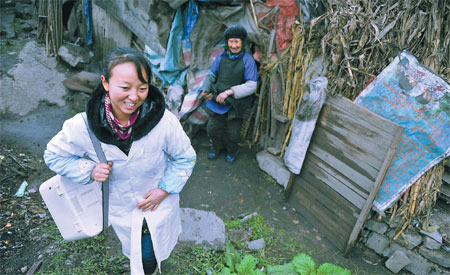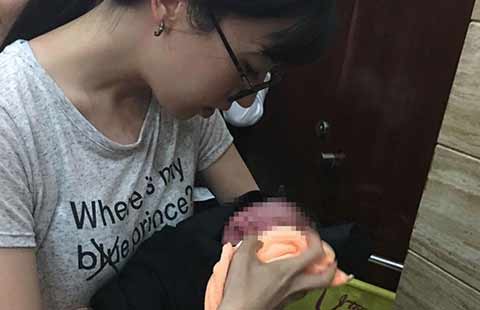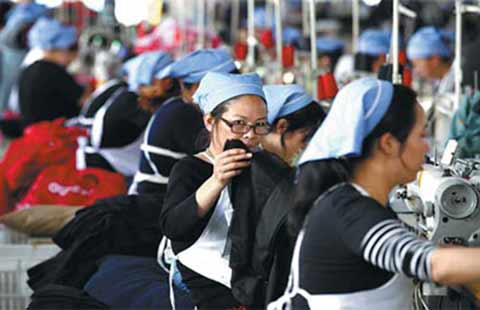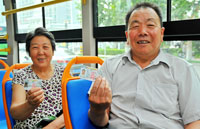Rural doctors bring hope
By Yang Wanli and Tang Yue (China Daily) Updated: 2013-01-09 07:32Harsh conditions
"My grandmother died from an unspecified disease. She didn't receive any medical help because of the lack of village doctors. After she died, I decided to attend technicians' school, despite the fact that working in the villages is hard," said Losong Gyaltsen.
The young man is not talkative, but recalling the first time he delivered a baby made him smile shyly. "The patient was in great pain and her family was very nervous. Her first baby had died during a difficult labor. I was scared, but I had to try," he said.
Losong Gyaltsen made a strong impression on Zhong Jing, 30, a village doctor from the southwestern province of Guizhou who was selected to deliver a two-minute speech in front of the vice-premier at the meeting on Saturday.
"He didn't speak Mandarin very well and it took a few minutes for us to discover his name," said Zhong, recalling the moment she saw Losong Gyaltsen for the first time. "Chinese women are shy and embarrassed to be treated by a man. It is definitely much harder to persuade women from ethnic groups to be treated by a man, especially if he is helping them to deliver a baby."
Unlike Losong Gyaltsen, Zhong already had some experience of meeting high-level officials and had traveled to Beijing on a number of occasions. Last year, she went to the capital four times to receive awards, including that of "excellent young worker".
In 2008, she quit her job at a public hospital in Guizhou and went to serve the 4,000 residents of Longhe village. That came about because her husband had been relocated by his employer, but when he was sent to the provincial capital after just three months, Zhong chose to stay with the rural community.
She recalled the day after her husband left. "Scores of villagers waited outside my house in the early morning. They had prepared rice, chicken and vegetables as gifts, hoping to persuade me to stay. I was told that an 87-year-old villager often thought of me in her last few days. That rarely happens in big hospitals, but the relationship between villagers and village doctors is more like that between relatives," she said.
During the past four years in Longhe village, she has used some of her savings to buy new equipment for the local health center, including ultrasound equipment. About 40 percent of the women in the village have been helped by the equipment she bought.
"On Friday, I was asked to tell one of the 'top officials' about the difficulties we encounter in our work, but it wasn't until the next morning that I discovered the 'top official' was the vice-premier," she said. "I was very nervous. When the meeting started, my hands were sweating so badly that my list of points became a mass of soggy paper," said Zhong.
Zhong told Li that two problems needed to be addressed - a lack of medical insurance to cover potential claims for negligence or accident, and the dearth of opportunities to upgrade their working knowledge.
After working in public and private hospitals for many years, Zhong said village doctors are liable for their own insurance and compensation and one slip can easily bankrupt them. She told how one local village doctor paid tens of thousands of yuan in compensation when a patient died after undergoing acupuncture treatment.
"We dare not to provide a wide variety of services, such as injections. We prefer to give patients traditional Chinese medicine or basic check-ups because of the risks," she said.
Most village doctors in China have studied at technical schools rather than medical colleges, but in rural areas they perform the same duties as general physicians in urban areas. Their job is often demanding because they are often the only option for residents, even in the most severe cases, as poor transport links restrict access to hospitals.
"Village doctors need better training to meet the demand. But in many rural areas even running water cannot be guaranteed, let alone the Internet," said Zhong. "Villagers sometimes ask us to treat their sick chickens, but of course, we don't know how to deal with them."
- Xi: Public health should underpin all govt strategies
- Female sci-fi writer wins Hugo accolade
- Spending patterns show shift to healthy lives
- Nation's next generation of missiles to be highly flexible
- Organ harvesting rumors slammed
- International trade corridor tested
- China's organ donation cases rise 45 percent in H1 of 2016
- Li urges top advisers to rely on broad vision
- China to strengthen regulation on real estate agencies
- Beijing garrison gets a new commander











